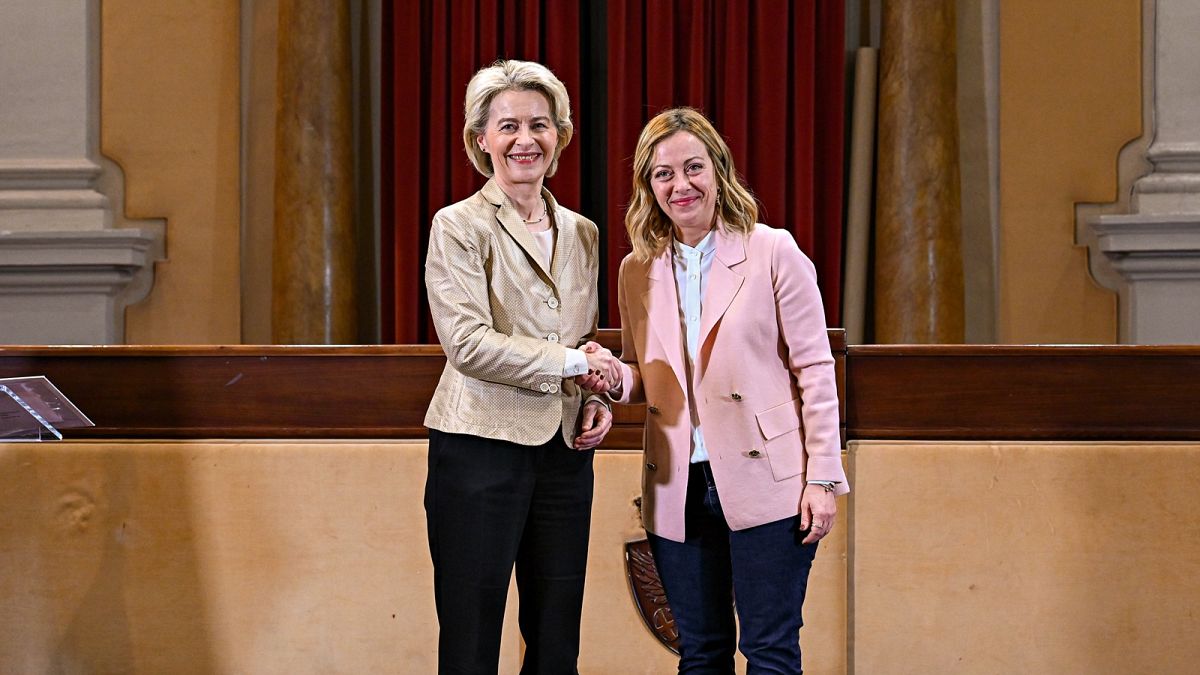The Green Deal has been “too ideologically driven” and needs to be rethought to emphasise the “competition angle,” says Thanasis Bakolas.
The centre-right European People’s Party will not seek to strike a formal deal with Giorgia Meloni and her hard-right European Conservatives and Reformists (ECR) group, neither to re-elect Ursula von der Leyen nor to underpin a governing majority in the next mandate, the EPP’s secretary general said a day after the elections.
The polls saw the EPP conquer with 186 seats, far ahead of the 135 obtained by the Socialists and Democrats (S&D) group and the 79 of the liberal Renew Europe.
“The EPP will seek to form a majority in the European Parliament with friends and allies that we have worked before with the Socialists, with the Liberals, hopefully also maybe with the Greens. And the numbers are there for such a majority, and that’s good,” Thanasis Bakolas told Euronews on Monday afternoon.
But, Bakolas added, when it comes to “major legislation, we will look to MEPs that are willing to listen and to vote for us.” This cooperation will depend on whether lawmakers further to the right are pro-European, pro-rule of law and pro-Ukraine, he said, echoing the main criteria that von der Leyen established during her campaign.
“Giorgia Meloni’s MEPs may want to vote for us. And I think that would be great. But I don’t see any institutional or more formalised (deal) beyond that,” he added.
Asked if this rapprochement, even if on a case-by-case basis, could help normalise backward-looking policies, Bakolas praised Meloni’s approach to European politics.
The Italian Prime Minister is a “leader who’s very well-liked and well-respected in the (European) Council, not only with EPP leaders but with other leaders as well. She’s very constructive. And she works well at the Council and that’s important for Europe because she’s from a big country, from Italy. So that’s the fact,” Bakolas said.
“At this point, Giorgia Meloni is a very constructive actor in the European scene.”
A possible EPP-ECR alliance has dominated the electoral cycle and fuelled continued speculation about the future direction of the European Parliament. Von der Leyen was asked several times whether she would accept or reject Meloni’s votes, giving each time a more explicit answer that she would, in fact, embrace them.
But as the provisional results turned official on Sunday evening, von der Leyen suddenly changed the tune and extended her hand to Socialists and Liberals to build a strong centrist majority for the next five years – with no mention of Giorgia Meloni.
“The centre is holding,” von der Leyen said.
The incumbent president also refused to say whether the Greens, which fell from 71 to 53 MEPs, would be part of this pro-European majority, simply noting her priority would be S&D and Renew and that the door remained “open” for others.
In his interview with Euronews, Bakolas did speak of the Greens as possible partners for a grand coalition that can “go the long run and that can grow as well.”
“The cordon sanitaire will hold,” he predicted.
‘The Green Deal is not dead’
The 27 leaders are set to meet on 17 June and 27 June to discuss the distribution of top jobs, where von der Leyen’s re-election bid will be put on the table. After being nominated to head the European Commission for another five years, she will have to face a confirmation hearing in the European Parliament. There, she will need at least 361 votes in favour. Back in 2019, she passed the test by just nine votes.
While the leaders’ endorsement appears all but guaranteed, the path in the Parliament will be “tricky and difficult,” Bakolas admitted. Von der Leyen’s ambitious Green Deal has alienated some of her EPP fellows, most notably Les Républicains from France, who have denounced her for embracing “de-growth policies promoted by the left.”
“The work needs to be done politically to motivate our MEPs to follow the line that the leaders want. And it’s really important, in my opinion, that the Parliament acts in a strategic and a very political way because this is the only way we can maintain a centrist coalition,” Bakolas said.
“We’re a big party, we’re a big tent,” he added. “We have to go through the motions.”
The EPP’s increasingly antagonistic rhetoric against the Green Deal, encapsulated in the fierce battle to bring down the Nature Restoration Law, has enraged progressives, who argue the conservatives want to pause – or even reverse – the efforts made to achieve climate neutrality. Some of the explosive claims the EPP used to contest the Nature Restoration Law were described by NGOs as disinformation.
“As a political party, we want the Green Deal to succeed and ultimately that’s what people want,” Bakolas said. “We’re not climate deniers.”
“But I think there was a collective failure in a sense, when it comes to the Green Deal because it was too ideologically driven. And we at the EPP also have a responsibility because we allowed it to be ideologically driven,” he added.
In his view, the missing piece was the “competition angle.”
His comments on environmental “ideology” resembled the arguments that Meloni and her hard-right allies have employed to denounce the Green Deal. In their manifesto, the ECR manifest vows to turn the multi-pronged initiative “on its head.”
“We are intent on protecting citizens, farmers and businesses from the negative impacts of the current over-ideological green climate policy,” the manifesto reads.

